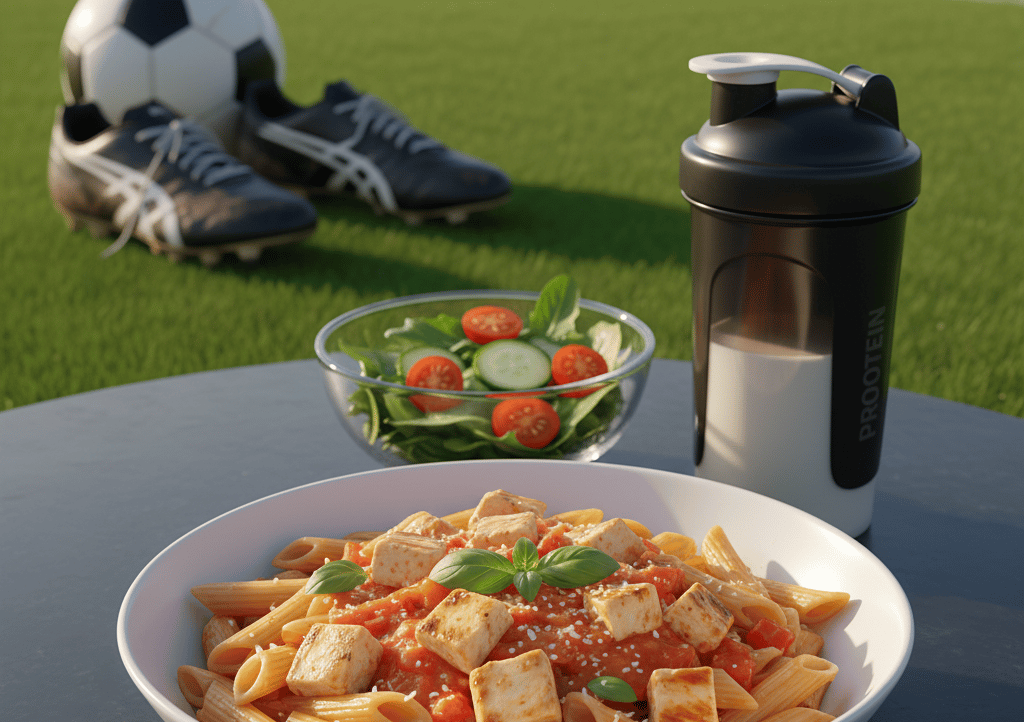Goal Mode On: The Ultimate Indian Diet Plan for Footballers in Mumbai
Ready to boss the midfield for 90 minutes and extra time? ⚽ Fuel your sprints, power your shots, and outlast the competition with our winning Indian diet plan (veg & non-veg).
Shuaieb Khan
5/13/20254 min read


The whistle blows. For the next 90 minutes, it’s a non-stop battle of speed, skill, and stamina. Football is a game of relentless energy. You’re constantly moving, making explosive sprints, challenging for the ball, and tracking back to defend. By the 80th minute, when the game is on the line, what separates the good from the great is who still has fuel left in the tank.
Your talent can take you far, but your engine determines how long you can last at peak performance. And that engine is built in the kitchen. For a footballer, food isn't just for taste; it's high-performance fuel. Let's get your nutrition plan sorted to make sure you're the one making that game-winning play in the final minute.
The Footballer's Fuel Hierarchy
The beautiful game has some beautifully simple nutritional rules.
Carbohydrates are the GOAT: No debate. Carbs are a footballer's primary energy source. Your body stores carbs as glycogen in your muscles, which is the fuel you burn during all that running and sprinting. A low-carb diet for a footballer is like putting basic fuel in a Ferrari—you’ll break down before the finish line. Complex carbs (brown rice, pasta, oats, sweet potatoes) are your best friends.
Protein is Your Powerhouse: Strong legs for powerful shots, a solid core for balance, and the ability to win a 50/50 challenge—that's all backed by muscle. Lean protein helps build and repair these muscles, ensuring you come back stronger after every single match and training session.
Hydration is Your Playmaker: Dehydration is the ultimate performance killer. It causes fatigue, cramps, and slows down your decision-making on the pitch. Staying hydrated is one of the easiest ways to maintain your competitive edge for the full 90 minutes.
Match Day Playbook: What to Eat and When
Timing is everything in football, and that includes your meals.
Pre-Match Meal (3-4 hours before kick-off): This is your main fuel-up. Focus on a high-carb, moderate-protein, and low-fat meal. Think pasta with a simple tomato sauce, dal and rice, or grilled chicken with sweet potato.
Half-Time Refuel: You have 15 minutes to top up your energy. Go for easily digestible carbs and fluids. A banana, a sports drink, a few slices of orange, or an energy gel are all winning choices.
Post-Match Recovery (The Golden Window): Refuel within 2 hours of the final whistle. A protein shake followed by a balanced meal with plenty of carbs and protein is the perfect hat-trick to kickstart recovery.
The Ultimate Indian Footballer's Diet Plan
Here’s your weekly strategy to stay match-fit.
Veg Footballer's Diet Plan
Breakfast: A big bowl of oatmeal with fruits and nuts, or 3-4 idlis with a generous serving of sambar.
Lunch: A large portion of rajma or chana with brown rice, a side of sabzi, and a bowl of curd. This is peak endurance fuel.
Evening Snack: A paneer sandwich, a fruit smoothie, or a bowl of sprouts.
Dinner: Soya pulao packed with vegetables or a couple of multigrain rotis with paneer bhurji. Load up on carbs to replenish your glycogen stores for the next day.
Non-Veg Footballer's Diet Plan
Breakfast: A 4-5 egg-white omelette with whole-wheat toast, plus a glass of fresh juice.
Lunch: 150g grilled chicken breast with a large serving of pasta or quinoa, and a side salad.
Evening Snack: A chicken salad wrap or a handful of almonds.
Dinner: 150g baked fish with roasted vegetables and a portion of mashed sweet potato. This is a perfect recovery meal that’s high in protein and nutrients.
Don't Get a Red Card for Dehydration
This can't be stressed enough. Drink water throughout the day. Monitor your urine colour—it should be a light straw colour. If it’s dark, you need to drink more. During games, sports drinks with electrolytes can be a game-changer.
Hosting the Ultimate Match Night? Call the Professionals.
Football nights are a big deal. Whether you're hosting the crew for a nail-biting derby or organizing an event for your local football club, the food needs to be legendary. That’s a job for Food Trail Catering Co.
We are fan favourites and one of the top 10 caterers in Mumbai. Our house party catering Mumbai service is perfect for creating an electric match-day vibe at home. Planning a corporate sports event? Our corporate catering services in Mumbai deliver world-class quality every time. As the best caterers in Mumbai for small parties, we know how to make any gathering special. Don't just search ‘best catering services in Mumbai’—choose the team that always scores the winning goal.
Frequently Asked Questions (FAQs)
Q1: What is the best thing for a footballer to eat or drink at halftime? A: The goal is quick energy and hydration. A banana, a sports drink containing electrolytes and carbohydrates, or a few orange slices are ideal. Avoid anything heavy or high in fat, as it will sit in your stomach and slow you down.
Q2: How is a footballer's diet different from a cricketer's diet? A: Both require endurance, but football involves more continuous, high-intensity running. Therefore, a footballer's diet is often even more heavily focused on carbohydrates as the primary fuel source to sustain that 90-minute, non-stop effort.
Q3: What are some signs of dehydration a player should watch out for during a match? A: Early signs include thirst, a dry mouth, and fatigue. As it gets worse, you might experience dizziness, muscle cramps, a headache, and a noticeable drop in your physical and mental performance.
Q4: Can a vegetarian diet provide enough energy for a high-intensity sport like football? A: 100% yes. Many elite footballers follow a vegetarian or vegan diet. A well-structured vegetarian diet packed with complex carbs (rice, pasta, potatoes, grains) and quality protein (lentils, chickpeas, beans, tofu, paneer) can easily meet the high-energy demands of the sport.
